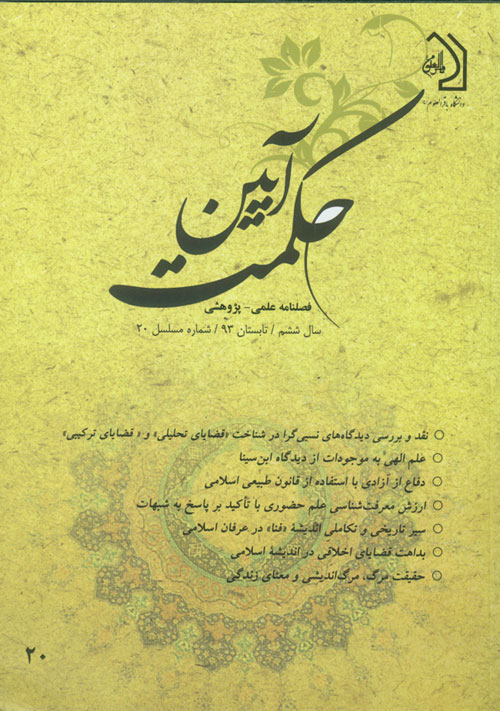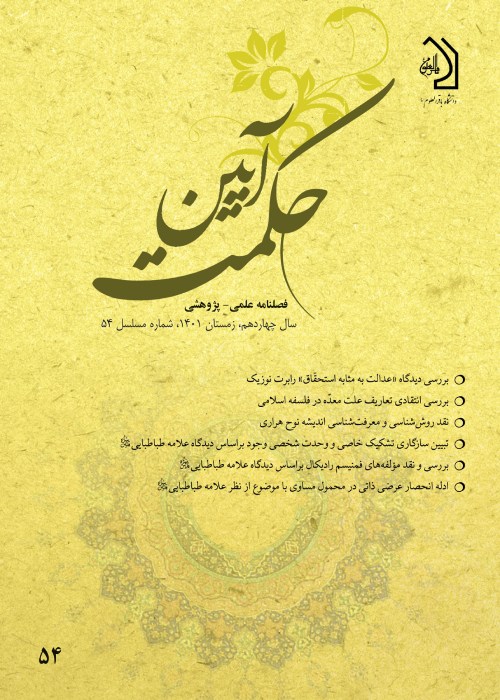فهرست مطالب

فصلنامه آیین حکمت
پیاپی 20 (تابستان 1393)
- تاریخ انتشار: 1393/05/21
- تعداد عناوین: 7
-
-
صفحات 29-50
-
صفحات 51-74
-
صفحات 95-120
-
صفحات 121-154
-
صفحات 155-183
-
Pages 7-28One of the most controversial problems in western epistemology is the division of propositions into analytic and synthetic. This division drew the attention of many proponents and opponents and faced many objections. One the most important objections which if valid enough، can destroy the basis of this division and resulting epistemological consequences is the of relativity of both analytic as well as synthetic propositions. Since this objection can somewhat impact similar propositions in Islamic tradition of logic and philosophy، it is worth discussing with especial importance. The claim of relativity of analytic and synthetic propositions has been variously formulated by Oberheart، Mass، Bent، Luise، Wiseman and Smith. This article is to first explain these statements of the problem and then to give due responses to it and finally concluded that on the basis of valid epistemological principles analytic and synthetic propositions are relative.Keywords: analytic proposition, synthetic proposition, epistemic relativism, epistemic absolutism, proposition, statement, predicate
-
Pages 29-50The present article is to explain Ibn Sina’s view on the God’s knowledge of things by rational-analytic method. Peripatetic philosophers including Ibn Sina have used the expression representation (irtisam) in discussing divine foreknowledge of things. Commentators and critics of Avicenna’s works had not the same interpretation of this expression but had given different understandings of it so that the God’s knowledge is explained in terms of presential knowledge in the eyes of some scholars and in the context of representational one according to others. Some of these interpretations are problematic. This article is an attempt to give an account of Avicenna’s view that seems to be correct and adequate to the author.Keywords: attributes of God, God's knowledge, Ibn Sina, Peripatetics, representational forms
-
Pages 51-74Having introduced briefly the doctrine of natural rule and its characteristics in the West, the present article is to advocate this rational theory of freedom. In doing so, with emphasis on three levels of human soul and observation of its natural possibilities the article goes on to explain philosophically the gift of freedom and its limits in terms of original theory of natural rule in Islam. The result of this philosophical new plan is that the true gift of freedom is first of two positive and negative aspects. In addition, the rational argument for natural rule in Islamic faith shed light on limits of freedom. The outcome of this rational rule is regarded as valuable and sacred all sorts of religious freedom that are identified through reason and scripture. In other words, it is shown on the basis of rational argument that Islamic faith restricts as well as sanctifies human freedoms in all aspects of individual and social life. Observing the religious standards of Islam, freedom can be a gift that leads all human beings to eternal happiness. By contrast, sorts of freedom that are opposed to Islam are against human perfection and lacking in value and so unsacred that make man wretched.Keywords: natural rule, nature of freedom, limits of freedom, levels of soul
-
Pages 75-94The warrant of truth has long been drawing the attention of philosophers.in order to find out the truth value one should determine first the criterion of truth. Discursive or representational knowledge are related to objects external of mind and so since external circumstances are involved in occurrence of this sort of knowledge, its truth value is diminished. Presential knowledge, however, is only dependent to the soul of the knowing agent for which reason its epistemic realm is the very reality and existence, in which the existential correlation of knowledge, knowing agent and object of knowledge put an end to the problem of warrant of truth. Some philosophers and scholars have disagreed with this position and raised various objections to it which are all intended to destroy the epistemic value of presential knowledge. Some of these objections are originate from explanatory language of knowledge by presence. Although the possibility of error is plausible, it is fallacious to extend explanatory force of this type of knowledge to its epistemic function. Other objections attempt to violate the epistemic circle of presential knowledge reducing its epistemic function. The source of these doubts is failure to note three characteristics of this knowledge: lack of mediation of any conceptual form; existential relation with soul and that any act of presential knowledge can be of representational interpretation the last being susceptible of error.Keywords: presential knowledge, warrant of truth, epistemological function, conceptual form, explanatory language, linguistic skepticisms, discursive interpretation
-
Pages 95-120In Islamic mysticism by annihilation it is meant the removal of any determination, tendency of delimitation to non-delimitation and transformation of multiplicity into unity. The study of historical development of the concept of annihilation can be helpful in understanding and analyzing this fundamental doctrine of mysticism. In early mystical works extant in world of Islam, hardly can one find a full-fledged concept of annihilation. Rather they contain a primary version with moral themes rather than ontological and philosophical ones. These simple concepts continued to develop well into the seventh century when it changed drastically with the rise of Ibn Arabi. Thanks to the disciples of this mystical school a breakthrough was made in the domain of mysticism that led to dynamism of the annihilation doctrine. In this period it developed so much so that it found expression with rich terminology and dynamic concepts of annihilation. In addition to practical and theoretical progress of annihilation, no doubt, the impact of Islamic teachings in enriching the nature of annihilation seems to be decisive. The present article is to analyze and explore the evolutionary course of the annihilation theories in Islamic mysticism with a short glance at its historical developments which can yield the readers an account of the changes this concept underwent.Keywords: annihilation, progressive development, Islamic mysticism
-
Pages 121-154Some moral propositions are self-evident and are used as basis for justifying theoretical ones in ethics. While this view has long been raised in Islamic thought and explained in more detail by contemporary philosophers, the sort of their being self-evident is less explained and sometimes is subject to disagreement. The authors of the present article hold that at least two propositions of “justice is right” and “injustice is wrong” are primary self-evident. Whether they are analytic or synthetic, that the predicates can be essentially attributed to the subjects or need to be reasoned as in any so-called ḥml Shāyʿ(common predication) is the matter of dispute among scholars. They also argue over the question whether such qualities as rightness and wrongness are essential characteristics of justice and injustice or something concomitant with them. Again they do not have the same account of the concept of “essential” when attributed to the subjects concerned. Such propositions are self-evident not in virtue of being among primary concepts but because they are the intuitive propositions. Therefore, we can recognize some instances of right and wrong through presential knowledge.Keywords: justice, injustice, right, wrong, self, evident, presential knowledge, primary principles, intuitive propositions
-
Pages 155-183Death has been and is the most important problem of human being throughout the history. Every man is innately in the pursuit of immortality, life and well-fare as they also hate destruction and annihilation. This problem as well as related views and analyses of the true nature of death, the elements of reducing the dread of death have all direct effect on meaningfulness of life. Whether or not life is worth living and leads to other-worldly goal, and is susceptible of studying its functions and accomplishments are all related to meaningfulness or absurdity of life. Theistic view calls human being to reflect on creation and its purposefulness, to believe in resurrection and immortality. Good life and intellectual life in continuation of this worldly life is Quranic solution in rendering life meaningful. By correcting one’s view of death and the way he should confront it, man meet the challenge of absurdity of life and find instead spiritual rest and tranquility through the joy in attaining the Lord of the worlds.Keywords: death, meaning of life, immortality, life, man


